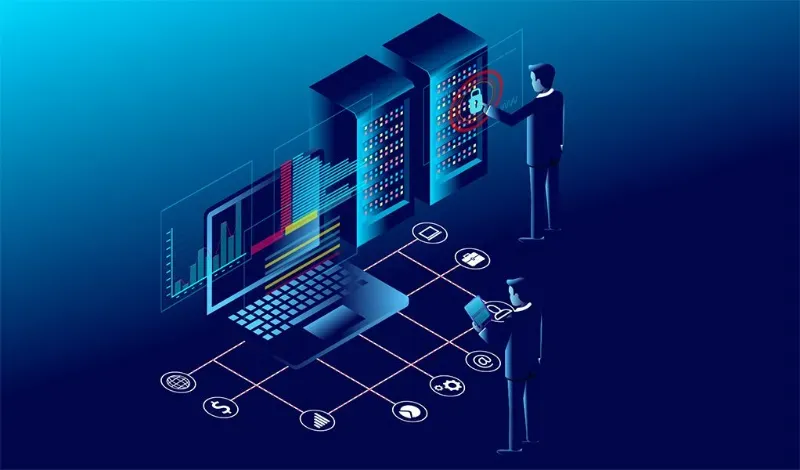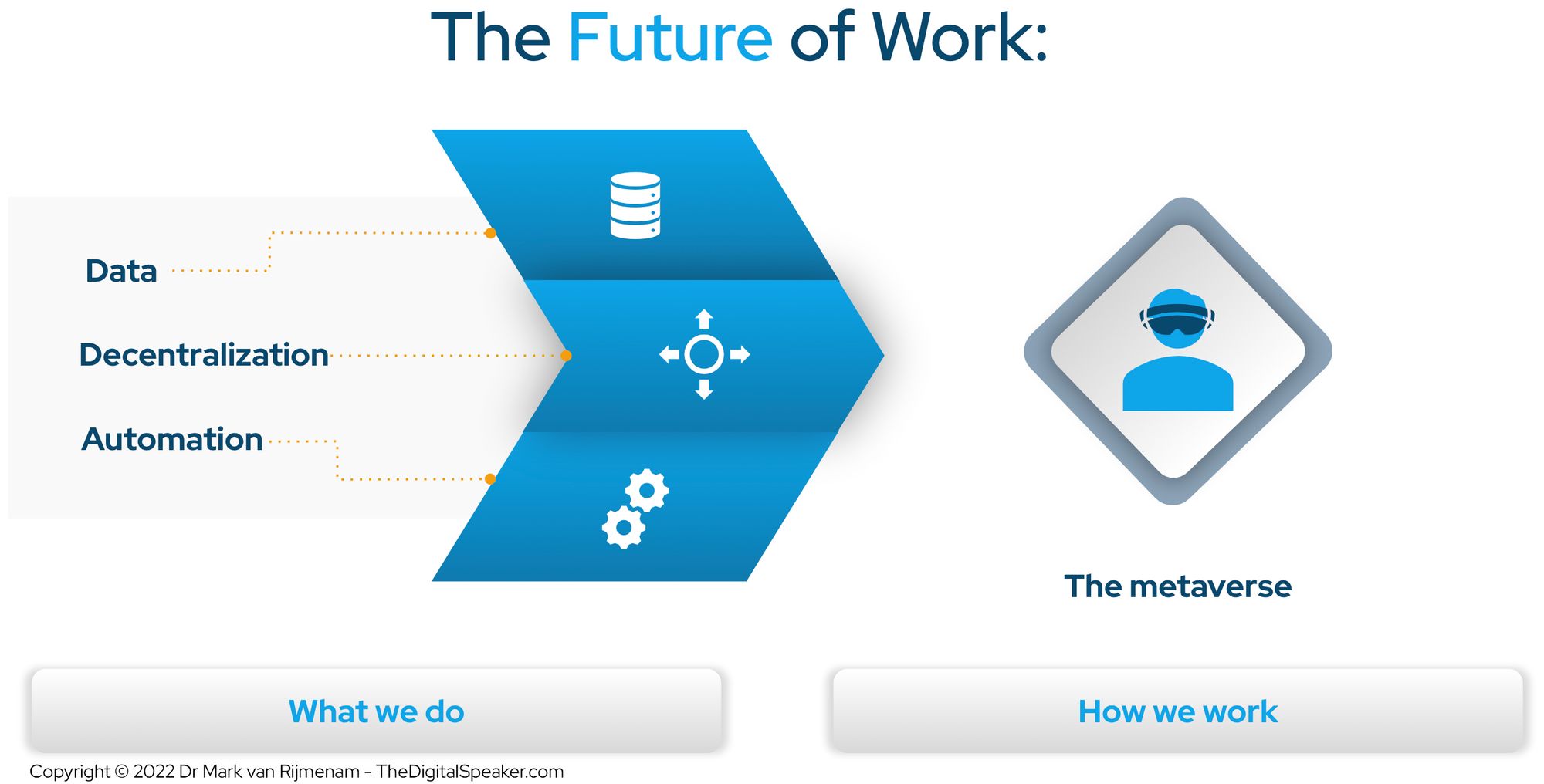How the Future of Work will Improve the Employee Experience

Since the start of the internet, we have slowly transitioned from an analog species to a digital species: Homo Digitalis. Nowadays, for most of humanity, the internet has become the norm, and we spend many hours per day on the internet and are connected with (digital) technology. The pandemic has been a catalyst for a trend set in motion a few decades ago.
If anyone had said at the end of 2019 that a few months later, many organizations worldwide would work from home, nobody would have believed it. However, that is what happened. Fortunately, the technology was ready for it, and many employees replaced their morning commutes for sleep-ins and breakfast, their 1:1s in the office for walking phone calls, and their meeting room huddles for home-office Zoom, Teams, or Google Hangouts. All in all, we did remarkably well. This shift to remote work, including online social gatherings, online pub quizzes, and even a complete virtual Burning Man festival, would not have been possible if the technology wasn’t ready. Had the pandemic happened five or ten years ago, we would not have been able to make the switch so easily.
However, not everything was perfect, and many employees struggled with working from home, as Dell's recent Breakthrough study revealed. The in-depth study of 10,5000 respondents worldwide revealed that 50% of respondents find it difficult to collaborate remotely or connect with colleagues, and 41% of respondents believe staff are wrestling with burnout and/or poor mental health that’s impacting their ability to do their work.
Fortunately, there is hope for this group. As technology will continue to become ever more prevalent, how we interact with it and how we use technology to connect and collaborate with colleagues will drastically change this decade.
The Future of Work Changes Organizations
As technology becomes a more important part of our work, human-machine interactions become the norm. We will move toward bionic organizations where data enable humans and machines to collaborate seamlessly. The future of work revolves around data, decentralization, and automation, changing what we do. At the same time, these trends are converging into the metaverse, which will radically change how we work.

Data Enables Employee Empowerment
In the past decades, data has become a requirement for competitive advantage. Data enable organizations to sense what is happening within the organization and external to the organization. All employees should have access to relevant data sources and real-time insights to make the best decisions for the customer and the organization.
However, knowledge equals power, as the philosopher and statesman Sir Francis Bacon already knew in the 16th century. If employees are empowered with valuable insights, it will change the power dynamics within the organization, moving it away from the leadership to those employees facing the customer. Of course, this should not mean that leaders should avoid democratizing data to hold onto their power and influence, as the benefits of data are too big to ignore. It will require, however, a different leadership style.
More importantly, empowered employees are happy and productive employees. Embracing big data analytics will positively impact the employee experience and, as such, the bottom line. Interestingly, according to the Dell study, 50% of the respondents expect that data insights will make employees and organizations more entrepreneurial and allow employees to better spot new opportunities. At the same time, 38% of respondents fear they will become overwhelmed by the flood of data available, meaning not only can data directly impact the employee experience, data also requires the full attention from the leadership within the organization.
Decentralization Will Streamline Operations
Decentralization also requires the attention of management, as it can have such a big impact on the business. Blockchain offers a single source of the truth when collaborating with industry partners, and it can ignite the human-machine partnership. What used to be done with pen and paper and intermediaries can now be streamlined with cryptography and smart contracts. Instead of complex administrative processes that add unnecessary bureaucratic layers, decentralization will remove complexity and simplify the work to be done.
As such, blockchain can be considered the golden standard for supply chains. It will streamline administrative tasks when organizations collaborate in a global supply chain. It will allow (operational) staff to focus on what really matters instead of being burdened by repetitive administrative tasks. According to the Dell study, only 37% of respondents surveyed currently experience mentally stimulating and non-repetitive work. It means there is still a world to win by applying decentralized technology and using distributed ledgers to remove intermediaries and digitalize and automate administrative tasks.
Automation Will Make Organizations More Humane
While blockchain and smart contracts can be used to automate collaboration between organizations, artificial intelligence and machine learning can be applied to automate mundane internal tasks. After datafying your internal processes and customer touchpoints, you have the data at hand to automate those processes and customer touchpoints.
A simple example is the use of chatbots to resolve the first line of questions your customers might have. By analyzing your call center data, you can clearly find the most common questions and train a chatbot to answer those on behalf of your call center agents, allowing your employees to focus on the more challenging questions.
Technology can also help simplify collaboration, for example, when it comes to scheduling meetings. Especially in global organizations, with teams scattered across time zones, it can be challenging for employees to show up early morning or late evening while not being an early morning or evening person. Automation can help schedule such meetings, taking into account the individual preferences of employees, resulting in happier and more productive employees.
The Metaverse Will Change Collaboration
Such an approach to automation will become more critical as we are now at the dawn of the metaverse. This next iteration of the internet, where the physical and digital worlds converge into a ‘phygital’ environment, will fundamentally change how we work. It will usher in an era where we move from 2D collaboration to 3D collaboration and where we can say goodbye to Zoom fatigue, thereby creating a more positive employee experience and potentially reducing burnouts. Zoom fatigue is caused by increased eye contact with monitors, increased cognitive workload, restricted physical mobility, and self-evaluation when visualizing yourself constantly on a real-time camera feed.
The metaverse will make collaboration and interactions more authentic and less exhaustive. Humans are made for 3D and not 2D, so the metaverse will enable users to leave Zoom fatigue behind once and for all. It will be an entirely new way of working, as collaborating in a digital 3D space is more intuitive than using 2D tools, especially when colleagues are geographically apart. It will make collaboration fun again, instead of a tiresome experience, and have a positive impact on the employee experience.
Over time, as the metaverse becomes more realistic and we move away from cartoony avatars without legs to hyper-realistic digital replicas of ourselves, it will further disrupt career mobility and collaboration. Once the difference between meeting physically or digitally disappears, something I expect to happen around the end of this decade, (digital) employees no longer need to go to the office, and we can move from (partially) Working from Home to Working from Anywhere, all the time.
At the same time, while for many employees these emerging technologies are challenging to work with or incorporate into their day-to-day job, for Gen Z (those born 1995-2010) and Gen Alpha (born since 2010), these immersive technologies are a daily practice. These generations are the metaverse-natives, and if you want to attract them as future employees, you will need to embrace the metaverse within your organization.
Forward-looking leadership is vital
Embracing the metaverse, and the converging technologies enabling the metaverse, is easier said than done. It requires a culture of innovation, a deep understanding of these technologies, and forward-looking leadership embracing innovation instead of preventing it.
Especially because, according to the Dell study, 61% of respondents worry about being at the mercy of remote edge technology. This fear can be removed only if the leadership has a clear understanding of what emerging technologies entail and how they will impact the business. Forward-looking leadership that takes responsibility for the impact of future technologies on the business and builds a culture of innovation and change is vital if an organization wants to remain competitive and relevant in the years to come. After all, if the leadership does not understand future tech, how can we expect the employees to do so?
Digitally transforming your organization is difficult, especially because we live in exponential times, and change happens faster than ever before. That is why forward-looking leadership is more important than ever. Technology can have a positive impact on the employee experience, working with people to make each organization not only more humane but also more human. According to Breakthrough, 67% of respondents polled believe their organization underestimates the people needed to make an impactful transformation. To succeed, organizations will need to lead by example, putting people at the core of each innovative endeavor and embracing change in all its forms.





